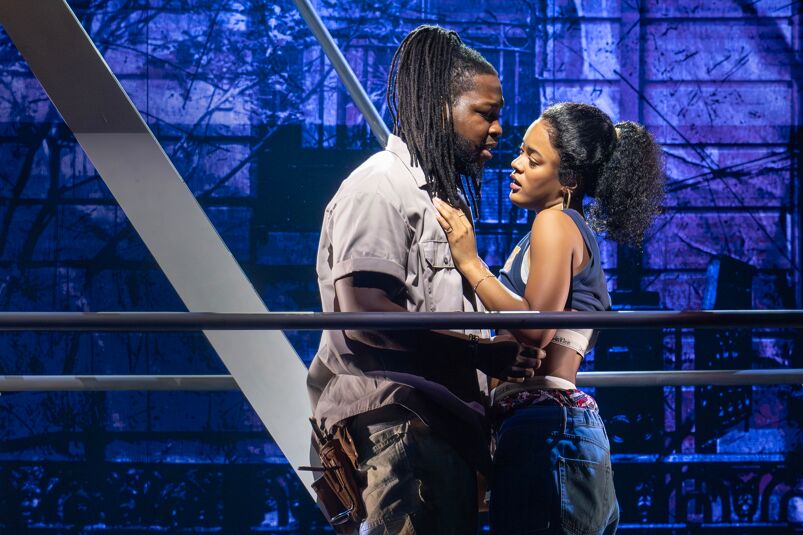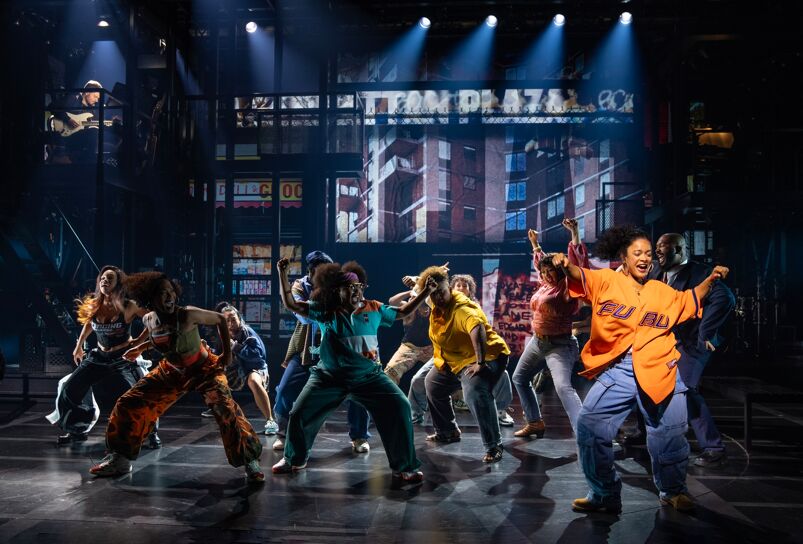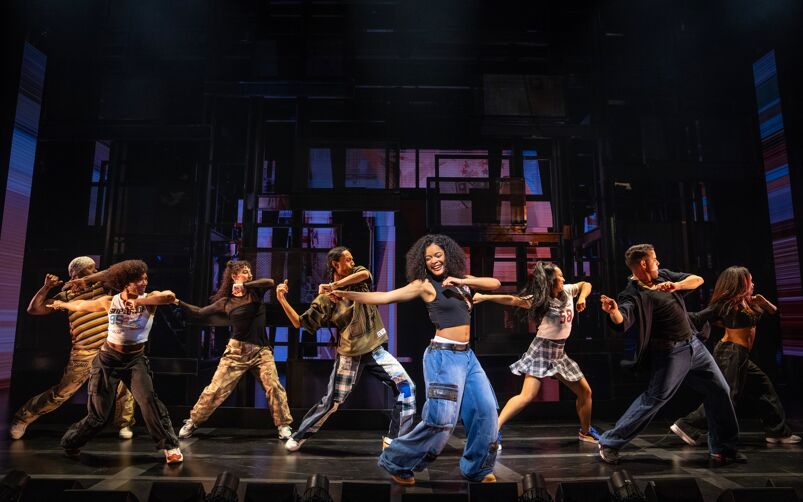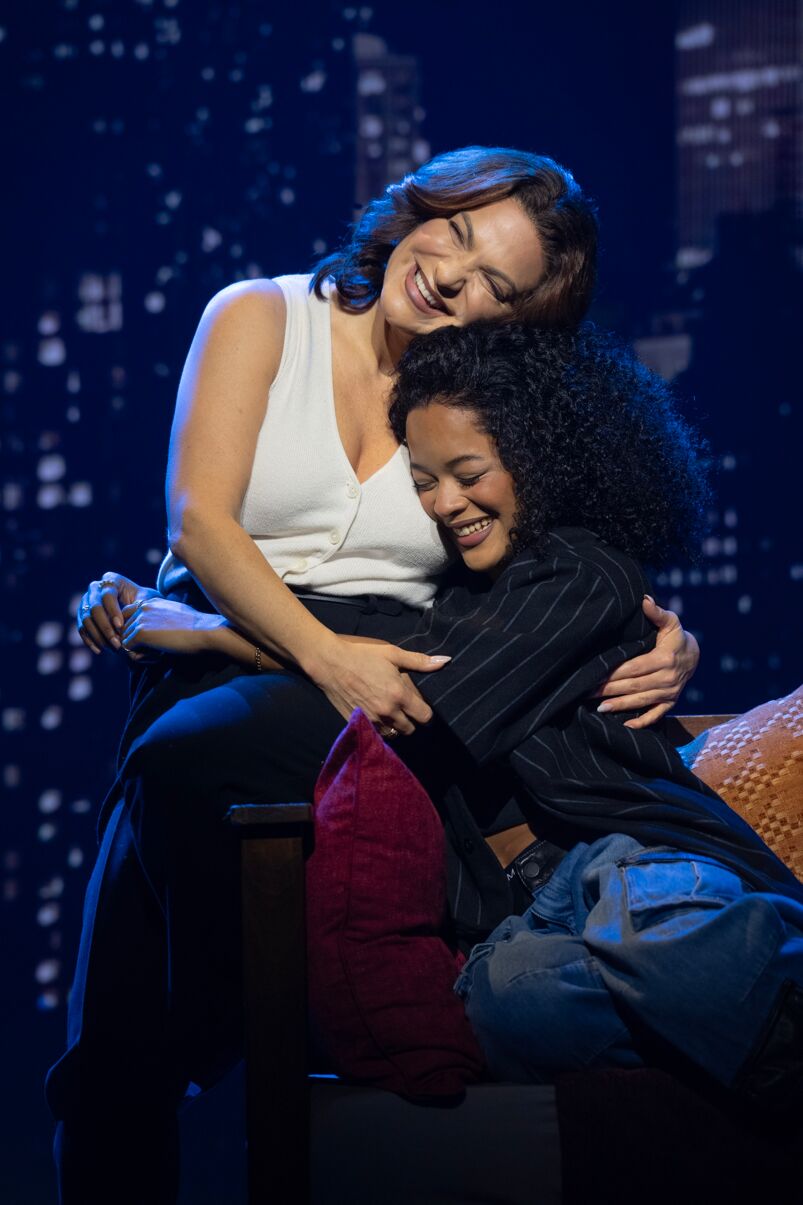
The Rundown
A resident of New York City’s Manhattan Plaza, a soaring, two-tower affordable housing apartment complex in Hell’s Kitchen just steps from Broadway, Alicia Keys grew up in good company.
Past and current residents have included Timothée Chalamet, André De Shields, and Tennessee Williams. But the starry names on the inside haven’t always reflected the struggles on the streets outside before the neighborhood became a mecca for New York City gay nightlife.
In her “new” musical Hell’s Kitchen, more than a decade in the making, Keys reflects on her formative years with the help of her Grammy-winning catalog, a book by Kristoffer Diaz, choreography by Camille A. Brown, and a star turn by Keys vocal doppelgänger Maleah Joi Moon that takes the show to stratospheric levels.
No Tea, No Shade

Time-stamped late-90s, in large part thanks to costume designer Dede Ayite’s colorful, often oversized overalls, baggy pants, and cropped tanks, Ali (Moon) addresses the audience to bridge the gap between the musical’s straightforward plot: rebellious teen vs. overprotective mother. Ali’s inner thoughts provide much of the musical’s emotional heavy lifting, allowing audiences to see the 17-year-old’s vulnerable side. Interactions with her mother, Jersey (Shoshana Bean), and short-lived boyfriend, Knuck (Chris Lee), rely on the coping mechanisms she’s built to survive her experiences on the streets outside and the intermittent appearances of her mostly absent father, Davis (Brandon Victor Dixon).
Ali, who’s grown up hearing musicians and singers among the hallways of the artist-subsided building, stumbles across Miss Liza Jane (Kecia Lewis) in the multi-purpose Ellington Room, where the elder comes to play the piano. The pair begins to meet regularly as Ali discovers her gift for music and an outlet for her feelings.
As far as jukebox musicals go, Hell’s Kitchen mostly strikes a chord thanks to Moon’s captivating performance. Under Michel Greif’s direction, Moon (she/they) delivers a magnetic star turn from which it’s nearly impossible to revert one’s gaze. At times adolescently flirtatious while stalking her new crush, then pivoting to rage and grief as Ali challenges her mother’s tough love, Moon’s delivery feels as fresh as today’s high school students seen on the streets of Hell’s Kitchen.
While not nearly as shoehorned as & Juliet, which features an overload from the Max Vernon songbook, Hell’s Kitchen occasionally falters under the same fate, such as when Moon and friends pine for Knuck and his friends to Keys’ “You Dont Know My Name,” or later, when her mother chases down Ali’s dad for a heated confrontation to the tune of “Pawn It All,” both of which feel like abrupt pivots from Diaz’s otherwise cohesive book.
With more specificity developed for mom Jersey and part-time dad Davis, Ali’s journey is unstoppable, hopefully with sound designer Gareth Owen in tow as the musical’s creators eye a Broadway transfer. The impeccable mixing captures the intricacies of the arrangements and orchestrations, giving Moon and the company artistic freedom to live in the work’s most intimate moments and later explode with unhindered energy.
Let’s Have a Moment

Fifteen-time Grammy winner Alicia Keys knows how to write a song, both lyrically and melodically. But Broadway has proven time and again that great musical artists don’t necessarily equate to a great musical. (Does anyone remember the flops Good Vibrations featuring the music of The Beach Boys or Jimmy Buffet’s Escape to Margaritaville?)
Director Greif, an expert in angsty musicals including Dear Evan Hansen and Rent, keeps the emotions in check and the pace clipping along to showcase Key’s triumphant score. But it’s choreographer Camille A. Brown who brings the most innovative movement to a New York stage since Hamilton.
Brown, Tony-nominated for last season’s for colored girls who have considered suicide/when the rainbow is enuf, brings a similar palpable energy to Hell’s Kitchen. Drawing inspiration from ’90s hip hop with references to moves like the Humpty Dance, the Bogle, and the Heel Toe, Brown puts the ensemble through the paces but only through the lens of storytelling.
The nimble and gloriously diverse ensemble interprets Brown’s movement from the gut. Where there’s joy, it’s born from the streets of Keys’ real-life upbringing. And when grief arrives deep into Act II (“Hallelujah/Like Water”), Brown’s guttural, modern movement — jarring extensions of limbs and contractions nearly painful to watch — takes the score and the story to new heights.
The Last Word

For queer audiences, there’s but one omission from Hell’s Kitchen and its portrayal of Manhattan Plaza. Keys grew up during the height of the AIDS crisis. The building, primarily occupied by those working in the performing arts, became one of the hardest-hit neighborhoods.
According to the NYC LGBT History Sites Project, at one point, the building had the highest per-capita concentration of AIDS-related deaths in the world. Residents established the Manhattan Plaza AIDS Project, a community initiative that provided care for those living with HIV/AIDS. Broadway actor Eddie Cooper, who also grew up in Manhattan Plaza, shared with Queerty, “Growing up in Manhattan Plaza during the ’80s and ’90s, people were dying all around me.”
Though Ali’s coming-of-age story need not heavily detour down this dark road in our collective queer history, perhaps creators can find some way to briefly pay homage to this lost legacy. Early in the musical, Ali says of the 46-floor apartment building, “You never know what you’re going to hear when these elevator doors open up.” Let’s not forget that many of these voices were silenced.
Still, Hell’s Kitchen provides a vibrant framework for Alicia Keys’ soulful songbook. With a few tweaks to strengthen its central character’s supporting relationships, it’s just a matter of time before the show turns up the heat on Broadway.
Hell’s Kitchen plays at The Public Theater through January 14, 2024.
Editor’s note: This review has been updated to read “vocal” doppelgänger to reference the similarities between Moon’s vocal quality and performance style and the show’s creator, Alicia Keys.




















Baron Wiseman
Golly, I’m starting to think that gays might be narcissistic. Just recently a Broadway musical that is presented without gays (Egads!) to debating the utter importance of rainbow colored hockey tap to how prepared your a$$hole is going to be on Thanksgiving. Gee, it sure is great to live in a free country where we can all experience these first world problems with total narcissistic abandon.
mike
Bitter, party of one!
LegionKeign
The gig is up.
You’re actually steve bannon and should take your crusty butt back to breibart to commiserate with the rest of the unwanted and unloved miserable folks.
You come here and all you do is try to bring everyone down with your totally useless comments but we see through your act, steve.
Step away from the bottle. Get yourself some help and try to find the smallest bit of something within that shriveled raisin of a heart to love about yourself.
abfab
Baron even LOOKS like Steve Bannon!
Gabby
Alicia keys is a terrible person.
Kangol2
Is she? How so? Do tell.
abfab
She can’t.
Kangol2
Yeah, she looks NOTHING like Alicia Keys. Maybe Matthew Wexler can’t tell Black people apart or used the wrong term (“doppelgänger”), but….
Kangol2
Given the history not just of Hell’s Kitchen during the period in which Keys’ musical is set AND the fact that her particular building was both a refuge for artists, including LGBTQ ones, and also was severely hit by the AIDS pandemic, it is telling that she doesn’t include some out gay characters, or at least one one. Do better, Alicia Keys–there’s always time to revise for the next run!
feromoon
Maybe she’s under the influence of religion nowadays and therefor forgets what really happened with the people around her while growing up.
bachy
Imagine mounting Hell’s Kitchen with an all-white cast. It would seem spectacularly inauthentic. Similarly, a story set in Manhattan Plaza during the height of the AIDS crisis feels odd without at least peripheral gay representation.
abfab
Alicia Keys live. Pitchy. She rarely reaches her higher notes. It’s so cringey. She screams. She’s often flat. Yet the people find her special.
It’s awful.